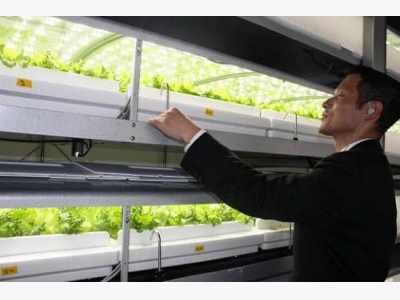Unused Tokyo tunnel gets new life as underground vegetable farm

Conveyor manufacturer Itoh Denki and electronics maker Fujitsu have set up an automated underground vegetable farm in a disused utility tunnel in Chiba Prefecture, just east of the Japanese capital.
Urban farms, vertical farms, even space farms have all been touted as solutions to the world's food security challenges. All, however, come with hurdles in terms of cost, sustainability and space.
This new concept not only has the potential to produce vegetables at a fraction of the cost and energy consumption, but also need never even be seen.
Thanks to the stable year-round temperatures, the farm can operate using just one-third of the electricity of a conventional vegetable farm.
The hope is that, by 2020, the plant will be shipping 5,000 heads of lettuce and other produce a day.
The vegetables are grown into seedlings overground before being taken down to the facility on a conveyor belt. Once ready for shipment, they are brought back up, packed and shipped. Apart from the sowing and packing, every step of the process is automated.
Underground, the vegetables are grown in 2.4- by 1-meter cases under light-emitting diodes that spur growth and fed nutrients through tubes.
At a balmy 18-20 C all year, the facility has no need for costly air conditioning and temperatures can be controlled by fans.
Dubbed "Makuhari farm vechica," the facility occupies 4,000 sq. meters of space, 10 meters below ground. The two companies spent 100 million yen ($882,744) building the farm on space rented for 770 yen per square meter annually.
Related news
 Record fruit-vegetable exports expected
Record fruit-vegetable exports expected The Ministry of Industry and Trade says fruits and vegetables have become Vietnam’s biggest farm produce export and are expected to set a new record in 2017.
 Technologies in the service of agriculture
Technologies in the service of agriculture Hanoi has gradually established high-tech agricultural production areas by strengthening scientific and technological applications in agriculture.
 First batch of Vietnamese star apple exported to the US
First batch of Vietnamese star apple exported to the US Vietnam has about 5,000 hectares of star apples, mainly in the Mekong Delta province of Tien Giang (3,100 hectares) and Can Tho city (1,200 hectares).